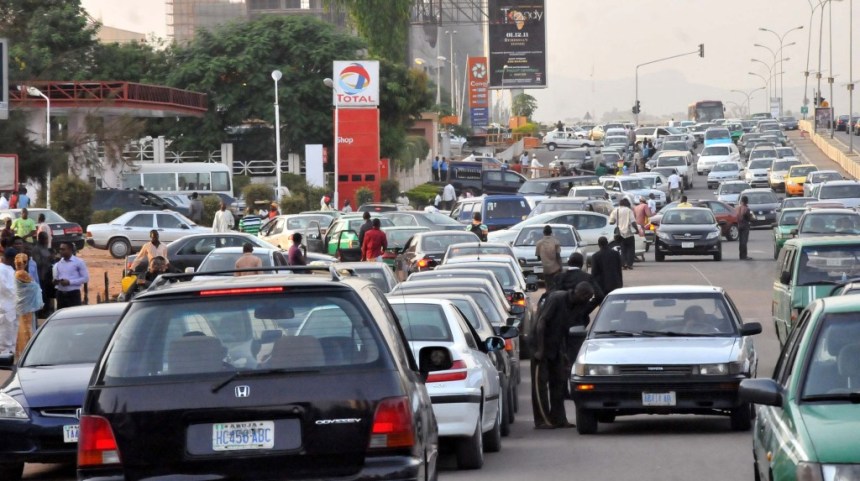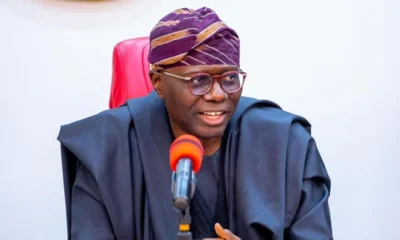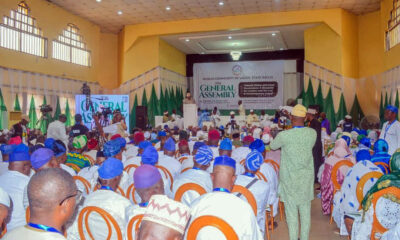metro
Fuel scarcity bites harder in Abuja, panic buying in Lagos

There is mounting anxiety in Abuja due to longer fuel queues as the petrol scarcity bites harder in the Nigeria’s capital.
This came on Monday just as motorists in some parts of Lagos, the nation’s commercial capital, resorted to panic buying of fuel as many filling stations on the Island were shut.
Long queues were also reported on the Lagos Island and a few other places in Lagos, giving rise to traffic congestion in the affected areas.
The Guardian reports that the panic began gradually at the weekend when unusual long queues of vehicles at various filling stations in Ikoyi, Victoria Island and Lekki were noticed as residents spent longer period trying to buy the Premium Motor Spirit (PMS popularly called petrol especially in the Lagos Island.
Many had attributed this to increased demand for fuel due to power outage following a fire incident that led to the shutdown of Nigeria’s largest power plant, Egbin, from the national grid, last week.
However, the long queues persisted on Monday morning despite improved power supply. There were long queues on Awolowo road in Ikoyi, which caused gridlock along the axis.
The situation was different on the mainland part of Lagos as queues were barely noticed at filling stations. This posed a challenge for motorists and commuters resuming their daily activities after the weekend break.
Most of the fuel stations visited in the metropolis claimed they were without supply. The few stations that had supply attracted long queues.
From Ojodu-Berger to Lekki, Gbagada, Alapere, Oshodi-Apapa axis, Ajah, Sangotedo, Mile-2, among others, long queues were sighted in filling stations, which in some stations spiraled into the major roads.
Many commuters along the Lekki-Epe Expressway, including Sangotedo and Victoria Garden City (VGC) axis had a hectic time in traffic. On the Island (Ikoyi, Victoria Island and Obalende axis), only a few stations had supply with manageable queues. It was the same situation along the Lagos-Ibadan Expressway.
But there were no queues at filling stations in Mushin, Isolo, Ejigbo, Ikotun and environs. The Guardian, yesterday, gathered that the flash petrol scarcity currently being experienced in Lagos is due to current effort by the Nigerian National Petroleum Company (NNPC) Limited to recall harmful imported petroleum products.
According to sources, most of the petrol imported into the country under the Direct Sale, Direct Purchase (DSDP) contract has a high content of methanol and ethanol, which are outside the official specification of Nigeria’s petrol. “This product is highly harmful to the market,” a source said.
A senior official in the downstream sector confirmed the development, adding that NNPC is currently doing a product tracing to contain the harmful implication in the market.
The fuel situation may be compounded in days to come should the Nigerian Association of Road Transport Owners (NARTO) make good its threat to down tools over rising price of diesel and operating cost.
It said in a statement on Monday that it would withdraw haulage service if the Federal Government failed to urgently address the rising cost of operation that its members were facing.
Top on the list, according to the union, is the ever-increasing cost of diesel, which petrol tankers run on and which is part of the determinants of freight charges. The cost of diesel presently is N430 per litre.
The association’s National President, Yusuf Lawal Othman, in a statement, said members would be advised to ground their haulage tankers if nothing was done to address the matter, describing the business environment as becoming unbearable. “Our people have parked their trucks and more people are going to park theirs,” he said.
While some states, including the Federal Capital Territory (FCT), has been struggling with fuel scarcity despite promises of sufficient petroleum products, Othman said the challenge could escalate across the country.
The association had earlier decried delay in the payment of about N45 billion bridging cost for diesel, demanding an increase in the transportation allowance factored into the pump price of petrol, but the continuation of subsidy payment on petrol meant that the freight cost would remain.
Decrying the prevailing situation, Othman said, “We will tell them (tanker drivers) to park if nothing is done because we can’t operate in such manner. Transporters, whose freight rate is fixed and regulated, cannot sustain the business if nothing is done.
“We can’t operate. We can’t work if nothing is done to increase the freight rate. The condition is unbearable because of the cost of diesel.”
He urged the Nigerian Midstream and Downstream Petroleum Regulatory Authority (NMDPRA) to urgently increase the freight rate to reflect the present cost of Automative Gas Oil (AGO) diesel and spare parts.
According to him, ex-depot cost of diesel soared to N401 per litre on Monday, adding that it might hit N420 per litre at the filling stations if nothing was done urgently.
The Guardian also reports that petrol sufficiency days and stock figures are receding, noting that the NNPC used to boast of 30 to 40- day stock sufficiency and about two billion metres, the record has dipped to 24.02-day sufficiency and about 1,345,338,930 litres stock of petrol.
Quoting from an official document titled: ‘Petroleum Products Stock & Days Sufficiency Report 27th January 2022,’ the from the NMDPRA, it states that Nigeria consumes between 54 million and 60 million litres of petrol daily.
metro
First Daughter of Murtala Muhammed Reflects on Life Without Father, Preserving His Legacy

First Daughter of Murtala Muhammed Reflects on Life Without Father, Preserving His Legacy
Aisha Muhammed Oyebode, the first daughter of late General Murtala Ramat Muhammed, has opened up about the challenges of growing up without her father, the late military head of state assassinated on February 13, 1976, and her ongoing work in philanthropy, governance, and education.
In an exclusive interview, Aisha, who is a lawyer, entrepreneur, author, activist, and philanthropist, described losing her father at age 12 as a profoundly harrowing experience. She recalled the “silence of absence” and the “noise of expectation” that followed his death, explaining that she had to grow up quickly while navigating the pressures of public scrutiny and preserving her father’s legacy.
“My father treated corruption as an emergency, not a talking point. He believed in strong leadership, discipline, clarity of purpose, and a deep commitment to Nigeria,” she said.
READ ALSO:
- Anambra Police Arrest Motel Owner, Two Others Over Firearms, Drug Trafficking
- 2 Nigerians Killed While Fighting for Russian Army in Ukraine War
- Atiku Denies Fayose’s Claims About 2027 Vice-Presidential Talks With Makinde
Aisha also highlighted the stabilizing role of her mother, Ajoke Muhammed, who raised six children after the assassination, instilling discipline, resilience, and a focus on education.
Currently, Aisha is the Group CEO of Asset Management Group Limited and the CEO of the Murtala Muhammed Foundation (MMF), where she champions girls’ education and youth empowerment. She noted that, particularly in northern Nigeria, female primary net attendance rates are as low as 47.3–47.7%, with young women’s illiteracy reaching 70.8%.
“From our experience, the solution to girls’ education must be holistic — removing economic barriers, ensuring safety, fostering community ownership, and making education relevant to livelihoods,” she said.
She emphasized that educating girls stabilizes families and strengthens the nation, adding that the MMF Foundation has been instrumental in providing scholarships, school feeding programs, and community initiatives to enhance female education.
Reflecting on her father’s legacy, Aisha described him as a man of humility, vision, and principle, whose simple resting place in Kano reflects a life devoted to duty rather than display. She and her siblings have committed to refurbishing his grave and that of their brother Zack while carrying forward his vision through their work.
“A grave does not hold a legacy — people do. The real monument to his memory is in how we choose to live, and the kind of Nigeria we are willing to build,” she said.
Aisha’s reflections combine personal remembrance, national history, and advocacy, highlighting the enduring influence of Murtala Muhammed on his family and the nation, while underscoring the importance of education, integrity, and principled leadership in Nigeria today.
First Daughter of Murtala Muhammed Reflects on Life Without Father, Preserving His Legacy
metro
Anambra Police Arrest Motel Owner, Two Others Over Firearms, Drug Trafficking

Anambra Police Arrest Motel Owner, Two Others Over Firearms, Drug Trafficking
The Anambra State Police Command has arrested three individuals, including a motel owner, in Uke, Idemili North Local Government Area, for alleged possession of illegal firearms and involvement in illicit drug activities.
Police spokesperson Tochukwu Ikenga disclosed that the suspects — Ifeanyi Ibeabuchi (39), Abdullahi Shaibu (26), and Obah Chima (18) — were apprehended by operatives of the Rapid Response Squad Awkuzu following credible intelligence.
The raid, carried out in the late hours of February 9, 2026, led to the seizure of multiple controlled substances, including Cannabis Sativa, Crystal Methamphetamine, Colos, and Mkpuru-mmiri. Authorities also recovered a Jojef pump action gun (breach number 21SA-0724) loaded with three live cartridges at the scene.
READ ALSO:
- 2 Nigerians Killed While Fighting for Russian Army in Ukraine War
- Atiku Denies Fayose’s Claims About 2027 Vice-Presidential Talks With Makinde
- Oshiomhole: Behold the 13th disciple of Christ
Ikenga noted that Ibeabuchi confessed to the offenses during initial investigations, which helped law enforcement track and arrest the two other suspects.
“The Command reiterates its commitment to sustaining ongoing operations against criminal elements in the state and urges members of the public to continue providing useful information to aid policing efforts. Further developments will be communicated as the investigation progresses,” the spokesperson said.
The Anambra State Police Command has vowed to continue targeted operations against firearms and drug-related crimes, reinforcing efforts to enhance public safety in the state.
Anambra Police Arrest Motel Owner, Two Others Over Firearms, Drug Trafficking
metro
2 Nigerians Killed While Fighting for Russian Army in Ukraine War

2 Nigerians Killed While Fighting for Russian Army in Ukraine War
Two Nigerian men have reportedly died while serving in the Russian Armed Forces during the ongoing Russia–Ukraine War in eastern Luhansk.
The deceased, Hamzat Kazeen Kolawole, 42, and Mbah Stephen Udoka, 38, were reportedly attached to the 423rd Guards Motor Rifle Regiment of the 4th Guards Kantemirovskaya Tank Division, according to Ukraine’s Defence Intelligence. Their bodies were discovered in late November 2025, highlighting the growing risks faced by foreign nationals recruited into Russia’s military operations.
Kolawole and Udoka reportedly signed contracts with the Russian army in the second half of 2025 — Kolawole on August 29 and Udoka on September 28. Udoka received no formal military training and was sent to the front just five days after enlistment on October 3. Kolawole also appears to have been deployed with minimal preparation, raising concerns over the treatment of foreign recruits.
READ ALSO:
- Atiku Denies Fayose’s Claims About 2027 Vice-Presidential Talks With Makinde
- Oshiomhole: Behold the 13th disciple of Christ
- INEC Seeks N1.04 Trillion for 2027 Elections, Operational Needs – Amupitan
The men were killed in a drone strike while attempting to storm Ukrainian positions, and Ukrainian authorities reported that they did not engage in conventional combat before their deaths. Kolawole is survived by a wife and three children in Nigeria.
Ukraine’s Defence Intelligence has used the incident to caution foreign nationals against travelling to Russia for employment, warning that recruits may be sent into dangerous combat units with little or no training. The deaths come amid increased recruitment of foreign fighters from Africa into Russian forces, sparking concern among human rights and foreign policy observers.
This development highlights the risks associated with participation in the Ukraine conflict as a foreign mercenary and underscores the humanitarian and security issues arising from the recruitment of untrained personnel into active combat zones.
2 Nigerians Killed While Fighting for Russian Army in Ukraine War
-

 News3 days ago
News3 days agoOyo Muslims Reaffirm Loyalty to Sultan on Islamic Matters — Grand Chief Imam
-

 Education16 hours ago
Education16 hours agoSupreme Court Affirms Muslim Students’ Right to Worship at Rivers State University
-

 metro15 hours ago
metro15 hours agoIKEDC Sets Feb 20 Deadline for Customers to Submit Valid IDs or Face Disconnection
-

 metro3 days ago
metro3 days agoFormer NAHCON Chief Explains Why He Stepped Down, Denies Conflicts
-

 International3 days ago
International3 days agoUS to Deport 18 More Nigerians on ‘Worst-of-the-Worst’ Criminal List (Full Names)
-

 Business2 days ago
Business2 days agoDangote Refinery Slashes Petrol Price to ₦774, Ends PMS Bonus Window
-

 metro2 days ago
metro2 days agoKwara, Katsina Bloodshed: TMC Condemns Attacks, Dismisses ‘Jihadist Preacher’ Claims
-

 Business18 hours ago
Business18 hours agoNaira Could Trade Below ₦1,000/$ With Dangote Refinery at Full Capacity — Otedola















